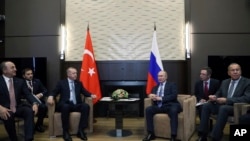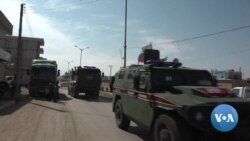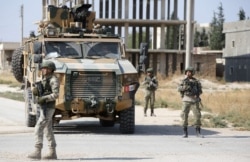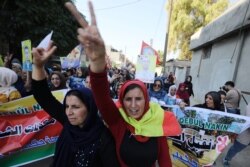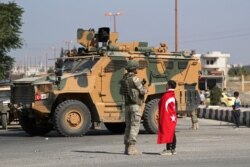Turkish President Recep Tayyip Erdogan declared it “historic,” while Russian President Vladimir Putin dubbed as “crucial” the accord aimed at ending Turkey’s military operation into Syria against a Kurdish militia.
But Ankara is warning of a resumption of fighting if the deal is not honored.
The Tuesday agreement struck in the Russian Black Sea resort of Sochi aimed to address Ankara’s vital security concerns.
Under the deal, Ankara has agreed to a 150-hour cease-fire to allow the Syrian YPG Kurdish militia, the main force within the U.S.-backed Syrian Democratic Forces (SDF), to withdraw 30 kilometers from the Turkish border.
Last week, Turkey launched a military offensive into northeast Syria against the militia. Ankara designates the YPG as a terrorist organization linked to the PKK, which is waging a decades-long insurgency against Turkey.
WATCH: US President Trump Announces Syria Deal with Turkey 'Permanent'
Turkey’s latest cease-fire agreed to with Russia follows an earlier suspension of military action agreed to Thursday with U.S. Vice President Mike Pence. The YPG was a crucial ally in the Washington-led war against the Islamic State.
Sochi agreement
The Sochi agreement is widely seen as far more comprehensive than Ankara’s deal with Washington. Under a 10-point plan, Turkish Russian patrols will enforce a 10-kilometer Syrian buffer zone on Turkey’s border.
However, the memorandum of understanding ends Erdogan’s goal of Turkish forces creating a 450-kilometer-long and 30-kilometers deep buffer zone into Syrian territory. A much smaller strip of 120-kilometers long and 30 kilometers of Syrian land secured by Turkish forces last week is under Ankara’s control.
Under the deal, Ankara is now relying on Moscow and Damascus.
“The implementation of the deal is passed on to both the Syrians and the Russians,” said former senior Turkish diplomat Aydin Selcen, who served in the region.
Erdogan, while welcoming the deal with Putin, warned Ankara was ready to resume its military operation.
“There will be no change in the steps we would need to take if promises made in the agreements with both U.S. and Russia will not be fulfilled,” Erdogan told reporters Tuesday while returning from Sochi.
“Although a ‘150 hours’ clause exists, the Turkish Armed Forces cannot realistically take on both the Syrian and Russian armies, as that will mean full-fledged war,” Selcen said.
Little trust between neighbors
Turkey’s Syrian military operation has isolated Ankara, with condemnation from Washington, the European Union and the Arab League.
However, analysts warn there is little trust between Ankara and Damascus, with Turkey severing diplomatic relations with Syria at the start of the civil war. Ankara is one of the principal backers of the Syrian rebels.
“Ankara will also be mindful, Moscow is courting the region’s Kurds. Putin is again dealing on the one hand with the Turkish side on one side,” said international relations professor Huseyin Bagci of Ankara’s Middle East Technical University.
“But is not closing the PYD (political wing of the YPG) and PKK offices in Moscow,” he adds. “He still keeps this channel open, and Turkey cannot do anything. Erdogan is not so strong to put pressure on Moscow to close those offices.”
Ankara will be aware that the Syrian Kurdish militia could rebrand itself as part of the Syrian army. Erdogan is calling for the disbandment of the militia.
Analysts also warn Erdogan could soon face pressure for the withdrawal of its military presence in Syria.
“Putin and other Russian officials repeated in Sochi that the “foreign troops” should leave Syria. Whom do they mean? Along with this logic, Turkish troops may be considered as foreign troops,” said Zaur Gasimov, a senior research fellow in the Russian studies department at the University of Bonn.
“If the borderland between Syria and Turkey were freed of Kurdish guerrilla groups, the issue of the presence of Turkish troops in that region would arise again,” he added.
Ankara is likely to come under growing pressure from Moscow to restore diplomatic relations with Damascus. Under the Sochi agreement, the 1998 Adana Agreement between Turkey and Syria was recognized as the basis for Ankara addressing security concerns.
The Adana Agreement ended Damascus’s support of the PKK, with the expulsion of its leader Abdullah Ocalan, who was subsequently captured by Turkish security forces in 1999. The accord allows Turkish cross border operations, but only with Damascus’ consent.
The restoring of Turkish-Syrian relations is, analysts say, a priority for Putin. Putin also stressed the need for Ankara to cooperate with Damascus on the issue of returning Syrian refugees from Turkey.
Erdogan is facing mounting domestic pressure to repatriate the more than 3.5 million Syrians in Turkey who fled the civil war. The Turkish president declared that the creation of a 450-kilometers-long and 30-kilometers deep so-called “safe zone” in Syria would allow up to 2 million refugees in Turkey to return.
But with the Sochi agreement ending Turkish military operations in Syria, the mass return of refugees is in doubt.
“The return of refugees is shelved, as 2 million Syrians will not be voluntarily squeezing into a 120 by 30 kilometers rectangle (Syrian territory under Turkish military control),” Selcen said.




